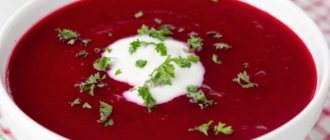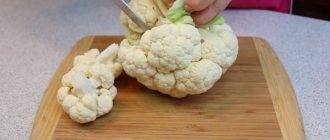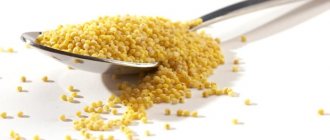What can you eat
Experts say that if the mother and newborn are absolutely healthy, they are not bothered by constipation and bloating, there is no need to adhere to a strict diet. Only minor food adjustments will be required. What can a nursing mother eat:
- Boiled veal, chicken fillet, turkey or rabbit meat, meatballs are allowed.
- Soups containing vegetables with no distinct color. Very good - soup with meatballs.
- Exclusively lean fish, such as cod or carp, pike perch. It is baked, stewed or boiled a couple of times a week.
- Curd and cheese, heat-treated. It’s good to make cheesecakes and cottage cheese casserole.
- Lactic acid products, only low-fat ones.
- Vegetables are good fresh or stewed, at least 400 g per serving.
- Berries and fruits - from 300 g per day.
- Wheat and oat porridge, from rice, buckwheat or corn.
- Eat bread with bran, rye, coarsely ground.
- Sweets can be replaced with a mixture of dried fruits. Compote made from prunes or dried apricots will be delicious.
- Butter – up to 25 g per day.
- Sunflower oil – up to 15 g per day. You can use olive or corn oil instead.
- Potatoes.
- Pasta and products made from it.
- Crackers and biscuits.
Cow's milk can be included in the diet in very small quantities to avoid the development of allergies in the baby.
Salad Recipes
There are many vegetable recipes, but not everything can be afforded by a young mother feeding a child. Recipes for breastfeeding should not have many components. Salads with fresh vegetables and fruits can be eaten only when the baby’s colic period ends.
Dishes that can be offered to a nursing mother may be as follows:
Caesar salad"
Photo from jessicagavin.com
- For 400 grams of boiled chicken breast you will need three slices of gray bread, 300 grams of lettuce, 100-150 grams of cheese, a pinch of sesame seeds and vegetable oil.
- Cut the boiled meat into cubes, add lettuce leaves torn into pieces, and top with pieces of dried bread, grated cheese and sesame seeds.
- Season with oil, preferably olive oil.
Greek salad
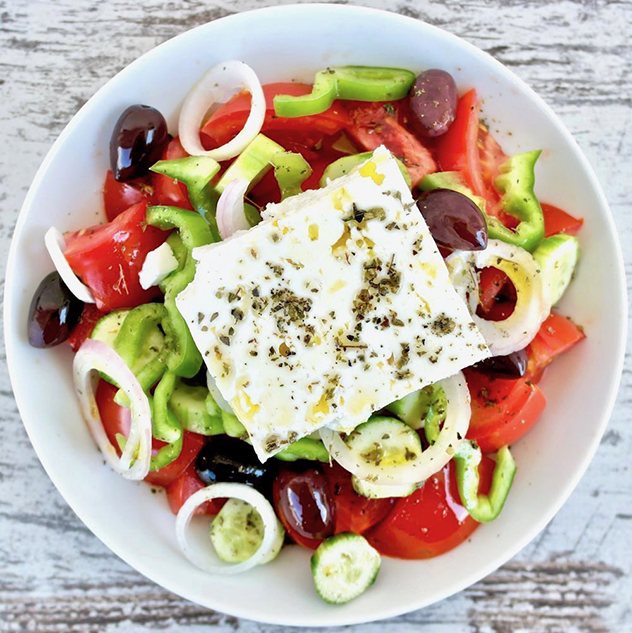
Photo from olivetomato.com
A simple and quick salad to prepare will be very useful for nursing mothers.
- For 300 grams of feta you need to take 2 peppers, 2 cucumbers, several cherry tomatoes, a head of sweet red onion and several olives.
- Chop everything and season with olive oil and lemon juice.
Beetroot salad with nuts
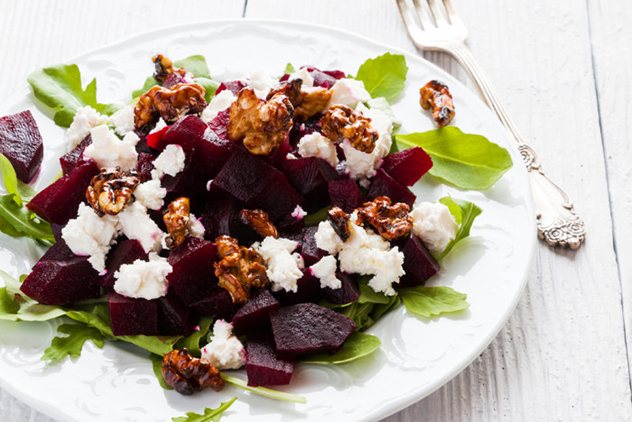
Photo from the site edinstvennaya.ua
A very hearty salad that will help cope with constipation in a young mother.
- Walnuts are suitable for it, of which you will need 1 tablespoon for 2 medium fruits.
- For piquancy, add a small head of red onion and season with flaxseed oil and lemon juice.
Meat salad with apples
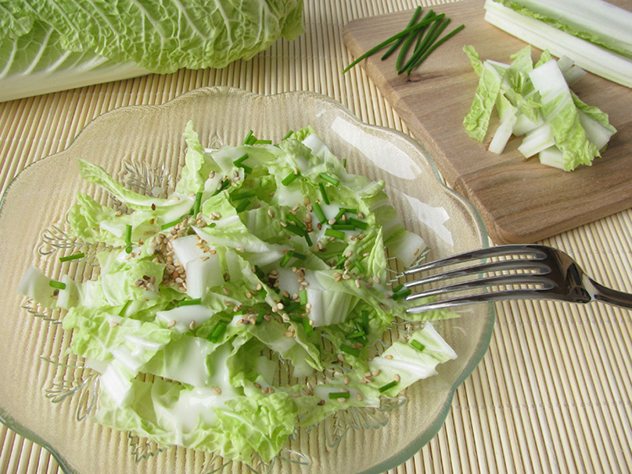
Photo from the site volshebnaya-eda.ru
This dish is suitable for every day, it is easy to prepare and contains vitamins.
- For 200 grams of meat you need to take 2 green apples and a bunch of lettuce leaves.
- Season with olive oil and lemon juice.
A nursing mother's diet must include fresh vegetables.
What is it better for a nursing mother not to eat in the first month?
Although during the lactation period food should be varied and nutritious, some foods should be abandoned. These include:
- fatty meats, especially fried (goose, pork, duck);
- any semi-finished products (sausages, sausages, etc.);
- mushrooms;
- sweet baked goods;
- nuts;
- citrus fruits, other fruits and red berries;
- concentrated meat broths;
- canned food;
- red bell pepper;
- legumes;
- ketchup and spicy sauces;
- cabbage, radish, radish;
- garlic and onion;
- alcoholic and carbonated drinks;
- rich tea and natural coffee.
Refusal of such food prevents negative consequences for the baby and helps a woman get rid of excess weight.
Products for nursing for 2-3 months
Immediately after giving birth, a woman is limited in the amount of food she can eat. This is due to the physiological characteristics of the newborn. When the baby goes through a period of adaptation, the mother’s diet is gradually expanded, introducing new dishes that have a positive effect on the composition of milk.
Having discussed with the pediatrician what a nursing mother can eat for a 2-month-old baby, the woman draws up a sample menu and follows it for up to six months. Products are selected taking into account the child's body. At the same time, mother’s diet should be varied, regular and contain only healthy foods.
Important Products
During the first months of life, children grow very quickly. The body expends a lot of energy, which must be replenished with nutrition. For the development of cells and tissues, “building material” is needed, and the baby gets it from milk.
Source of calcium
Not only at three months, but also in subsequent months, the baby’s skeleton needs an important element that strengthens the bones. Therefore, the menu should contain plenty of calcium-rich foods. Otherwise, along with the milk, the toddler will suck this element out of the mother’s body, which will immediately lead to problems with the joints and provoke tooth decay.
Important! If the amount of calcium salts in breast milk is underestimated, the baby may develop rickets.
A nursing woman should have an abundance of:
- potato;
- bread (yesterday's baked);
- cabbage;
- dairy products (cottage cheese, fermented baked milk, kefir, yogurt, cheese, etc.).
To increase lactation, it is recommended to drink at least a liter of warm milk per day, dividing the norm into 2-3 doses.
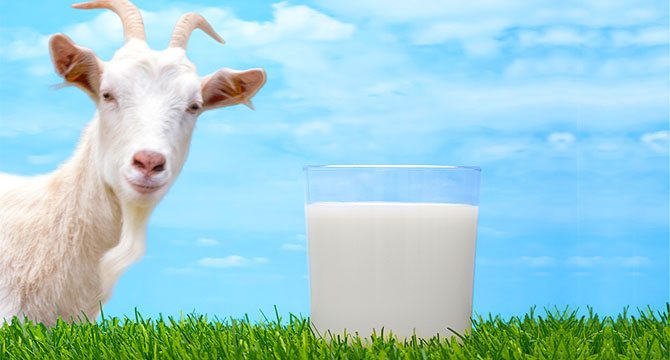
Source of calcium
Source of vitamins
In order for all the organs and systems of the baby to develop without pathologies, for the mucous membranes and skin to be in normal condition, vitamins are needed. A woman gets them from fruits. Berries, fruits, and vegetables are now available at any time of the year. Therefore, it is advisable to consume these products raw - during heat treatment and preservation, the level of vitamins decreases.
When choosing fruits, first of all pay attention to their color. In this case, Dr. Komarovsky recommends following the “traffic light principle”:
- in two to three months, “the road is open” to green products;
- yellow and orange, although saturated with vitamin A, are introduced into the diet with caution;
- You will have to hold off on red ones for now - they contain a high content of elements that provoke childhood allergies.
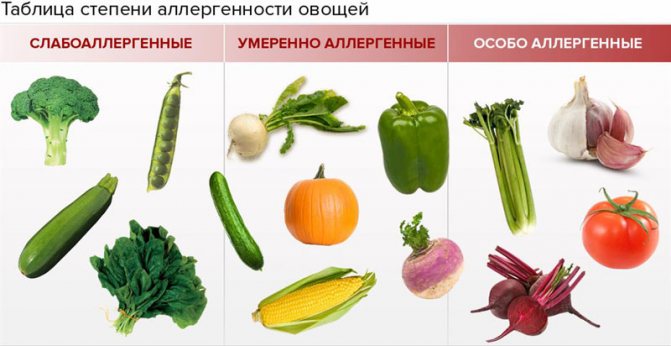
Traffic light principle
In addition to fresh fruits, the diet should include fruit juices, dried fruit compotes and other fortified drinks. The menu is varied with dishes made from boiled and baked fruits and vegetables.
Additional recommendations
Other products also affect the quality and quantity of milk:
- every day a nursing woman should eat at least 200 g of meat;
- 2 times a week - fish and seafood as sources of iodine and phosphorus;
- Cereal dishes will provide the body with energy;
- mushrooms, nuts, melons, brewer's yeast increase lactation;
- The source of polyunsaturated fatty acids is vegetable oil.
As for seasonings and spices, the list here is limited to a minimum. To diversify the taste of dishes, it is allowed to use non-irritating spices: celery, parsley, dill, green onions, marjoram, cumin.
What is taboo
Some products recommended for lactation can cause an allergic reaction in an infant. These include honey, some types of fish, strong meat broth, eggs in large quantities, and a number of fruits and vegetables. Therefore, if the baby has an imperfect immune system, these products are not included in the menu in the third month after birth.
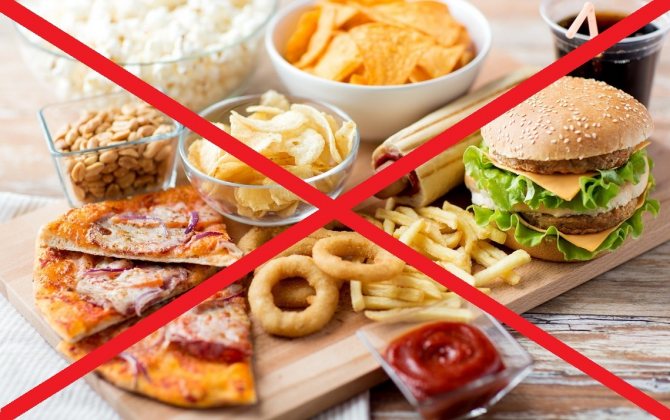
Prohibited products
When a nursing woman does not adhere to nutritional rules, her diet negatively affects the baby’s health:
- bloating in a baby will be caused by cabbage in large quantities, legumes, baked goods made from yeast dough, fresh bread, ice cream, pickled cucumbers;
- fatty meat (poultry), marinated fish, pastries, cakes, baked goods, semi-finished products, fast foods eaten by a woman can disrupt metabolic processes in the toddler’s body;
- A cup of strong coffee or a piece of dark chocolate drunk by the mother will excite the child’s nervous system;
- a harmless glass of beer will negatively affect the brain activity of a newborn.
Note! Alcohol in any manifestation has a negative effect on nerve tissue and leads to the development of various pathologies.
The mother's passion for spices (pepper, garlic, horseradish, etc.) will spoil the taste of the milk, so the baby may suddenly refuse to breastfeed.
Basic principles of nutrition
The selection of diet must be approached responsibly. Products must be of natural origin and not expired. Healthy eating will help you recover faster after childbirth and prevent digestive disorders in the newborn:
- always try to eat at the same time in small portions;
- dishes should be served baked, boiled or stewed; marinated, fried and smoked products are excluded;
- a large role is given to fresh fruits and vegetables, as well as cereals;
- exotic fruits are not consumed, especially if the woman has not tried them before;
- a balanced diet should be ensured.
Naturally, it is necessary to create an adequate drinking regime. The liquid is drunk before meals or half an hour to an hour after meals.
How to cook stew during lactation
- You can only include in the stew those vegetables that are already included in the diet;
- For the first course, use two or three ingredients. After the test, observe the baby’s reaction. If there are no negative consequences, the stew can be eaten without fear. What to do if your baby has a food allergy, see here;
- Add new ingredients to the stew gradually, at intervals of 7-10 days;
- Select and wash vegetables carefully before cooking. These must be fresh and high-quality products without yellowed leaves, spots or black spots;
- You can add greens to the stew. The most useful and safe for breastfeeding are parsley and dill;
- The stew can be salted and peppered a little, you can add sour cream or vegetable oil to the dish. You cannot add hot spices, mayonnaise, soy sauce, ketchup, tomato paste and various marinades!

Interesting recipes for nursing mothers in the 1st month
Despite the existing prohibitions, you can come up with a lot of different dishes that contribute to the harmonious development of the baby.
Breakfast
In the morning, porridge is good, initially gluten-free (buckwheat, rice and corn, boiled in water). You are allowed to add a little butter.
A couple of times a week they eat low-fat cottage cheese instead of porridge. For drinks, we recommend an infusion of rose hips, weakly brewed green or black tea. To improve lactation, you can try special herbal teas. Any liquid should be drunk in moderation. Its excess promotes lactostasis, and its deficiency leads to dehydration.
The standard water consumption is 2.5 - 3 liters per day, including liquid taken with food. ½ of this should be boiled water.
Dinner
Make it a rule to eat soup every day, because hot liquid stimulates milk secretion. First they eat regular vegetable broths, after a week they try fish or meat ones. Some advise adding garlic there, claiming that when boiled it does not affect the taste of milk. Greens make food easier to digest.
Whole grain bread containing bran and crispbread is healthy.
For the second course you can stew zucchini, potatoes, and boil pasta. Be sure to eat meat - 100 g/day. Wash down with compote from a mixture of dried fruits.
Beneficial features
Rabbit contains more vitamins and minerals than other types of meat. The product contains B vitamins and ascorbic acid, iron and phosphorus, fluorine and potassium, manganese and many other useful substances. This is a low-calorie meat that can be included in the diet menu.
Rabbit meat performs the following beneficial functions:
- Improves the functioning of the heart and strengthens blood vessels, prevents the occurrence of atherosclerosis and hypertension;
- Normalizes material metabolism;
- Regulates blood glucose levels, suitable for diabetics;
- Forms and strengthens the bone skeleton;
- Strengthens teeth and gums;
- Improves the condition of hair, skin and nails;
- Useful for allergy sufferers, reduces the symptoms of this disease;
- Has a beneficial effect on digestion;
- Promotes weight loss.

Rabbit meat is a hypoallergenic product that can be eaten while breastfeeding without the risk of harming the baby. In addition, it contains minimal amounts of cholesterol, saturated fat and elastin. Therefore, such meat is easily digestible and does not cause problems in the baby’s digestion. After all, it is known that in the first two to four months a child is often tormented by colic and flatulence due to the new food that he receives from his mother’s milk.
Rabbit meat is digestible by 90%, while beef is only digestible by 62%. Rabbit is useful for small children, nursing and pregnant women, elderly people, allergy sufferers and diabetics, people with intestinal, heart and vascular diseases.
Delicious first course recipes for nursing mothers
A dish prepared according to all the rules will avoid disturbances in the digestive process.
Buckwheat soup made in a slow cooker
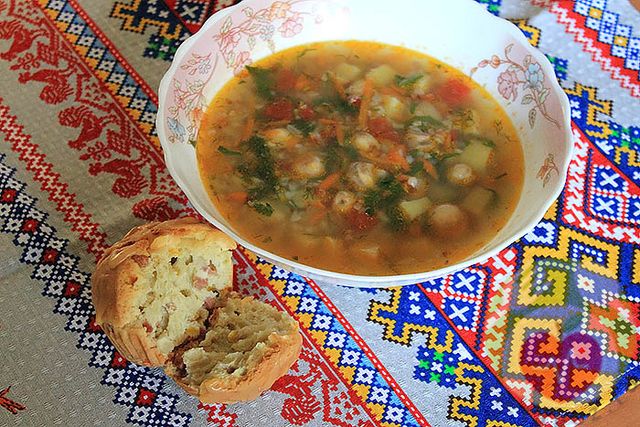
Ingredients:
- buckwheat - a glass;
- potatoes – 200 g;
- onion - 1 piece;
- carrot – 1 piece;
- vegetable oil - a tablespoon;
- parsley - a tablespoon;
- salt - to taste.
Vegetables are thoroughly washed and peeled. Finely chop the onion, carrot and potato. Place onions and carrots at the bottom of a greased multicooker bowl and sauté for 10 minutes. in the "Baking" mode. Next, pour in the buckwheat, and after 5 minutes, add the potatoes. In 10 minutes. pour one and a half liters of water, salt. And cook the soup in the “Stew” mode for 60 minutes. Add greens 10 minutes before the end of cooking. If you want a twist, mix 1 egg with a tablespoon of water in a glass and pour into the broth in a thin stream.
Meatball soup
Minced meat is made from dietary meat in a meat grinder. Wait until the water boils in the pan and add the chopped potatoes, carrots and onions. After 15 min. small meatballs and vermicelli are added. After another 15 minutes. After boiling, add salt and sprinkle with herbs.
Fish soup
Boil cod or pollock for a few minutes. Drain the boiling water, clean the fish from the bones, and divide it into small pieces. Cut up fish, potatoes, carrots, onions and a little rice cereal are dipped into new boiling water. After waiting for it to boil, leave on low heat for another 20 minutes. Salted, decorated with herbs.
Second courses
Great attention is paid to the type of heat treatment.
Zucchini with yogurt
200 g of vegetables are cut into cubes and add salt. Place in a greased frying pan, cover with a lid and simmer for 15 minutes. Pour 100 g of yoghurt and simmer for a few more minutes. Decorate with greens.
Meatballs
400 g of minced meat is combined with a glass of boiled rice, an egg, salt and finely chopped herbs. Mix thoroughly. Form small balls. Simmer for half an hour in a frying pan under sour cream sauce, covered with a lid.
Steamed fish cutlets.
300 g of fish fillet along with the onion in a meat grinder, add a couple of tablespoons of bran, an egg, salt and mix thoroughly. After 15 minutes, cutlets are formed and placed on a special grill. Prepares in 20 minutes.
Compotes
First, use apple or pear compote. One ripe fruit is washed, peeled and seeded, and cut into slices. Place in a saucepan and add 500 ml of water. After waiting for the liquid to boil, cook for 5 minutes. Leave it covered for another hour to brew.
An infusion of a mixture of dried fruits is also recommended for consumption: 50 g of dried fruits are washed and poured with boiled water overnight. You can add sugar if desired.
Rules for cooking rabbit meat
Tips for nursing mothers:
- Try to stay in moderation: don’t eat too much meat. It is advisable that the daily intake does not exceed 150 grams.
- Give preference to young rabbit meat. The younger the animal, the less fat it has accumulated.
- Do not introduce rabbit meat into your diet at the same time as other foods unknown to your baby. Carefully monitor your baby's behavior and health after your first serving of rabbit meat.
- If the dish does not suit the baby, give it up for exactly one month.
- Don't fry rabbit meat! Eat only stewed or boiled foods!
- Do not season meat with mayonnaise or ketchup. Use sour cream, low-fat yogurt, vegetable oil.
- Before preparing a rabbit for a nursing mother, soak the meat in water for several hours.
- Drain the first broth in which the meat was cooked. Then boil it in clean water.
Afternoon snack
For an afternoon snack, yogurt is allowed with the addition of pieces of peeled pears or apples.
Dinner
In the evening you can enjoy:
- Macaroni sprinkled with cheese and herbs.
- Meat stewed with rice.
- Buckwheat porridge with steamed cutlet.
- Cheesecakes and cottage cheese casserole made in a slow cooker.
- Pike perch stewed with potatoes or zucchini.
You can brew tea and drink it with marshmallows or crackers.
2nd dinner
Before going to bed, it is good to consume fermented baked milk or kefir.
What is allowed for a nursing mother in the following months?
Gradually expand the nutritious diet. New products are introduced slowly. If the baby does not have any disturbances in the gastrointestinal tract or skin rashes, they can be left.
The menu includes oatmeal and wheat porridge in water; you can dilute it with cream, add figs or dried apricots. Rarely eat 1 egg in the morning, no more, to avoid allergies.
It is suggested to try chicory. This drink normalizes intestinal function and contains no caffeine. You can serve oatmeal cookies with tea.
Soups are allowed to include beets, sorrel, and tomatoes stewed in a frying pan.
You can dilute with water and drink cherry or pomegranate juice. Slowly include currants (black and white), persimmon, melon, and watermelon into the diet. Children's curds and yoghurts are recommended.
Delicious recipes
Original food made from standard products will add unusual colors to a lunch or tea party with your family.
Curd banana smoothie

Ingredients:
- milk – 300 ml;
- cottage cheese – 100 g;
- banana - 1 piece.
Low-fat milk is poured into a large container, cottage cheese, washed, peeled and chopped banana are added. The contents are crushed with a blender. Ready-made smoothies are offered for breakfast or afternoon snack, or chilled.
Buckwheat-curd cutlets

Ingredients:
- buckwheat – 2/3 cup;
- water – 2 glasses;
- egg - 1 piece;
- cottage cheese -100 g;
- sugar, salt - to taste;
- breadcrumbs – 100 g;
- vegetable oil - a tablespoon.
The buckwheat is sorted out and poured into a saucepan, poured with water and cooked for 20 minutes after boiling. Leave for a few minutes to swell and cool. Place in a container and combine with low-fat cottage cheese, egg, sugar and salt. Form cutlets and roll in breadcrumbs. Simmer in a frying pan with the lid closed, remembering to turn over. The prepared dish will become an original dessert or addition to a main dish.
Possible harm from eating beef during breastfeeding
Unfortunately, even such a healthy product as beef has a number of side effects, which every nursing mother should definitely remember before eating dishes with this meat.
- First of all, you should remember that beef (especially the meat of an old animal) is poorly digested by our body. It's all about fairly dense meat fibers, which are difficult to chew and usually enter the digestive system whole. Increasing the load on the gastrointestinal tract can lead not only to digestive problems, but also aggravate the condition of the intestines during inflammatory processes.
- Excessive consumption of beef can lead to excess iron in the blood. In small quantities, this trace element is useful, but if it is in excess, problems with the cardiovascular system, as well as heart and liver diseases, can occur.
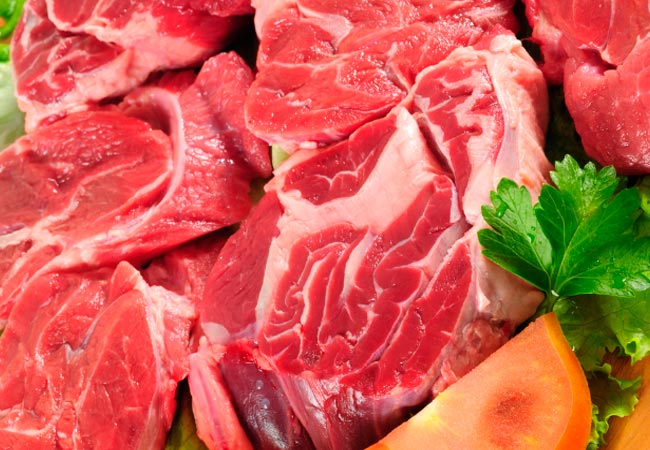
- It should also be remembered that animal protein often causes allergies and digestive problems in a child. The fact is that in the first months of life the baby’s body reacts sensitively to new products in the mother’s diet, and therefore adding such difficult-to-digest meat as beef to the menu quite often results in malfunctions in the body’s functioning.
- Beef belongs to a group of foods that pose a particular risk of food poisoning. Mild forms of poisoning are dangerous only for the mother - dehydration occurs, however, more severe varieties of this painful condition can also affect the baby, since toxins enter the blood and then into breast milk.
It should be noted that most of these side effects can definitely be avoided if a number of precautions are taken:
- Use meat from a young animal - veal is better digested and has less fat content.
- Buy only fresh meat from trusted sellers, avoiding markets and dubious places of sale.
- Boil beef well before eating.
- Follow the rules for introducing a new product into the diet and do not exceed the recommended volumes of meat per day for consumption.

